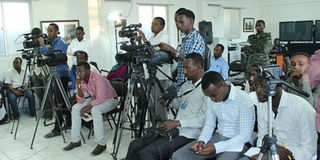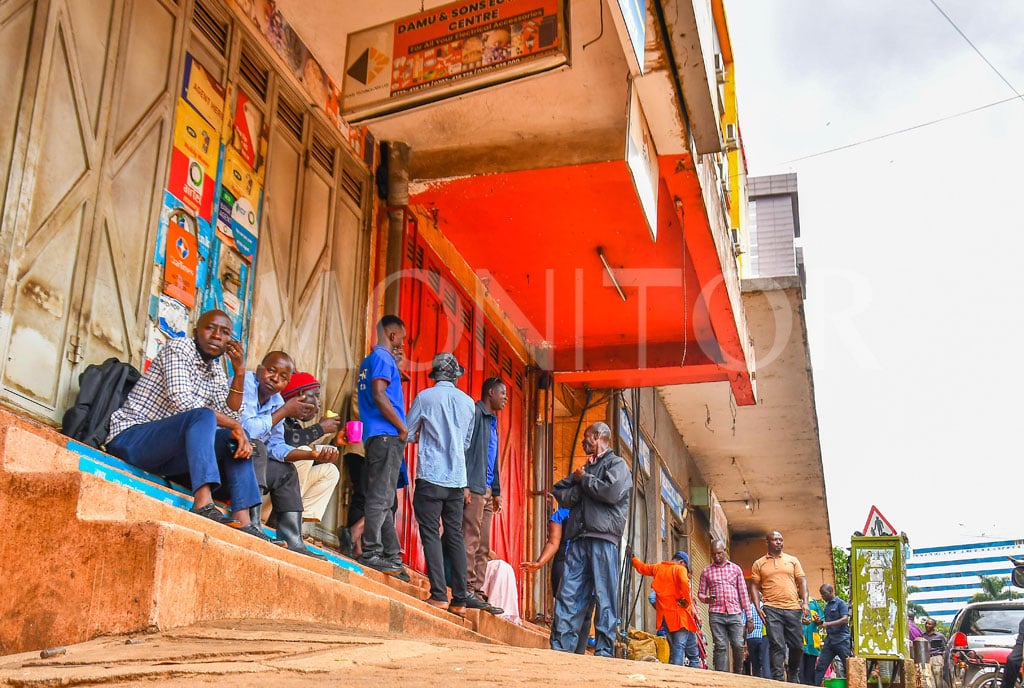Journalism in the most dangerous country on the continent

Journalists cover a press conference in the Somali capital, Mogadishu. The country, according to the Committee to Protect Journalists, is the most dangerous country to be a journalist in Africa. Journalists’ work is hindered by insecurity and inadequate institutions in place. PHOTO BY AMISOM PHOTO
“The force of the explosion lifted me into the sky and then I fell down, really hard. I tried to stand up twice without success. I realised then that I had been injured in the stomach. I looked around me; people were lying down, some injured; some dead. I can’t begin to describe how I felt,” narrates Sid Shire Warsame.
He is a Somali journalist that survived an attack by al-Shabaab at a public event he was assigned to cover. His story is not an isolated one. Many of the practising journalists in Somalia have either had a close encounter with death or lost colleagues and loved ones to terror attacks in the line of duty.
Ahmed Ali Kahiye, another journalist, has almost lost count of how many colleagues he has lost. “Many of my journalist friends have been killed. My brother was also killed. No one should ever have to die because of what they have said. It is against Sharia law and against Somali culture, to kill someone because of what they have said,” he passionately states.
Despite such experiences, these journalists choose to remain on course. Since 1992, the Committee to Protect Journalists lists close to 60 journalists that have been killed in Somalia. It also ranks Somalia the deadliest country to work in Africa.
Insecurity
The major challenges faced by journalists here include targeted killings, abductions, censorship and lack of the requisite knowledge and skills, among others. According to the National Union of Somali Journalists (NUSOJ), at least seven journalists were killed in Somalia while five others sustained life threatening injuries last year. Three journalists have been injured this year, luckily with no deaths reported so far. Some of the journalists have fled into exile after receiving death threats.
The role played by the media in support of the relative peace now enjoyed in Somalia cannot be underestimated. They have been vocal, calling for peace, challenging extremists and their attempts to keep the country drenched in terror and hopelessness. This has unfortunately made them targets for the militants.
“Being a journalist in Somalia is the most risky job you can do, even more dangerous than for the soldiers. This is because the journalists are seen as whistle blowers, the militant groups describe journalists as spies,” says Abdalled Ahmed Mumin Information and Human Rights Secretary, NUSOJ.
The Somali National Army supported by the African Union Mission in Somalia has largely displaced the al-Shabaab from their major strongholds in the country. They, however, remain scattered in different pockets across the country, launching sporadic attacks on weak targets, mainly unarmed civilians.
The Somali Police Force and the Somali National Army have in some cases offered special security to journalists facing specific threats. Nasad Bashiir Ahmed is a female journalist who has lived at the Ministry of Information offices since 2009. She has been an advocate for peace, sought to create awareness in her community and dispel many myths that the extremists use to exploit the society into joining terrorism. This made her an enemy and direct target.
She was lucky enough to be given a second chance. Suspected terrorists called her, told her to stop what she was doing and also threatened to kill her if she dared set foot in her paternal home. She gave up her home, her family but not her passion. She continues to pursue the cause of restoring peace in her country.
The Federal Government of Somalia recognises the challenges faced by the journalists and extends support to address some of these. Abdi Rahman Yusuf, the Director in the Ministry of Information says security is provided whenever possible and the journalists are also trained on how to ensure personal safety, detect potential threats and the mechanisms for reporting to facilitate prompt response.
Eroded institutions
Insecurity is not the only challenge the journalists face though. The two decades of war that the country suffered left most of the national institutions eroded. With support from the African Union which deployed its troops in the country in 2007, Somalia has enjoyed the longest period of peace since 1992, allowing for reconstruction of institutions.
Journalism too suffered. The media in Somalia is marked with limited skills, very low levels of professionalism as well as resources needed for the practioners to execute their mandate successfully. The journalists’ union recognises the challenge and appeals to development partners to continue providing much needed support, to improve the quality of journalism in Somalia.
“We want our journalists trained to understand the ethics and professionalism needed while reporting, especially on sensitive issues. This is very critical as the country has not had any high level training for journalists for decades. Somali journalists have suffered for long and it’s time for meaningful intervention from both the national institutions and the international community,” says NUSOJ’s Abdalle Ahmed Mumin.
As the rest of the world marked press freedom this month, with the day falling on May 3, for the Somali journalists, the battle goes beyond the intricacies of newsrooms, the challenges of state intrusion to an actual fight for their lives. The celebrations in Mogadishu are about the courage to practice journalism against all odds and even more so, the realisation of the need to further utilise the tools at their disposal to consolidate peace in Somalia.




